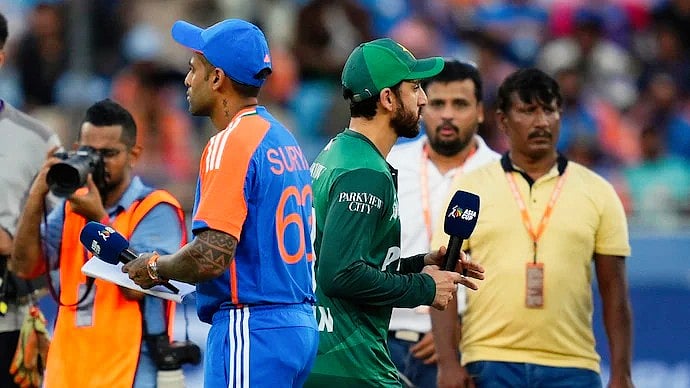Sports
Asia Cup: How tenable is it for India, Pakistan to play cricket anymore?
FIFA, UEFA ban on Russia shows there is room for sterner measures than a mere handshake refusal

It’s been nearly two days after the handshake saga at the India-Pakistan Asia Cup match on Sunday, but the ripples are growing every day. The news out of the Indian dressing room is that it was head coach Gautam Gambhir who masterminded the plan to avoid any niceties with the rival players as a ‘reminder’ of the Pahalgam massacre, while the Pakistan camp reportedly lodged a complaint with the ICC against match referee Andy Pycroft, without much success.
Explanations by captain Suryakumar Yadav and Gambhir have left no ambiguity about their stance — and Salman Ali Agha & Co can brace for another cold shoulder when the teams meet again in the Super Four stage on 21 September. It’s a gesture which has left the cricketing community split into two — one camp applauded it saying it was the Indian team’s call since a post-match handshake is not a rule but a gesture, which the Men in Blue were in no mood to show.
The other camp, meanwhile, feels that the politicisation of the whole issue is more for optics and an attempt by the BCCI to fire from the shoulders of the cricketers. The suggestion from this end of the spectrum had been for India to boycott the Pakistan matches altogether, without bothering about the consequences.
Published: undefined
Incidentally, it was the Union sports ministry’s directive on sporting relations with Pakistan on 25 August — arguably with an eye on the Asia Cup — which cleared the decks for the Men in Blue to play their arch rivals in Dubai.
While ruling out any bilateral contests between the two countries, which were in suspension anyway, the government directive said: ‘’Indian teams and individual players will take part in international events that also have teams or players from Pakistan. Similarly, Pakistani players and teams will be able to participate in such multilateral events hosted by India.’’ In other words, it was a status quo of the Indian policy, redefined in view of raw public sentiments after the terror attack in Kashmir on 22 April.
Let’s face it, what did the BCCI and the team stand to lose if they boycotted the Pakistan match on 14 September? A docking of points to start with — which would have made their progress in the tournament uncertain — not to mention a breach of contract with the broadcasters as India had agreed to play the Asia Cup at the ACC conclave in Dhaka.
The BCCI top brass also maintained that a selective boycott of Pakistan matches would risk a ban from the ICC and seriously hamper their chances of bidding for the Olympics and Commonwealth Games.
Published: undefined
It's this last argument which holds water if one looks at the bigger picture, but it also begs a what-if, should India be diplomatically able to convince the sporting world to treat Pakistan as a ‘rogue nation’. There is no bigger example than Russia, which has been paying for its full-scale invasion of Ukraine since 2022 as all their men’s, women's and youth football teams remain barred from all FIFA and UEFA tournaments, with the national men’s side unable to compete in the 2022 and 2026 World Cups and the 2024 Euro.
The International Olympic Committee (IOC), meanwhile, has barred Russia from the 2026 Winter Olympics for their expansionist plans. If India could have won a diplomatic war in convincing the sporting world as to why they would not engage with Pakistan, then a real war would have been won.
While a refusal of handshakes among sporting opponents is not uncommon in recent times — it’s nothing more than tokenism and a social media exercise to calm the nerves of the Indian public. Surya’s gesture, which now seems prompted, amounts to nothing beyond.
Well, how tenable is it for India and Pakistan to play cricket anymore - at least till there is a thaw in diplomatic relations? Enough bad blood has been generated over the last two days and loose comments from Mohammed Yusuf, a former Pakistan batting legend, has not helped.
The problem lies in the dynamics of the sport, whose economics is hopelessly dependant on this one match - it's the golden egg laying goose which no one wants to kill. Hence, the need to build a narrative from both sides aimed at one-upmanship!
Published: undefined
Follow us on: Facebook, Twitter, Google News, Instagram
Join our official telegram channel (@nationalherald) and stay updated with the latest headlines
Published: undefined